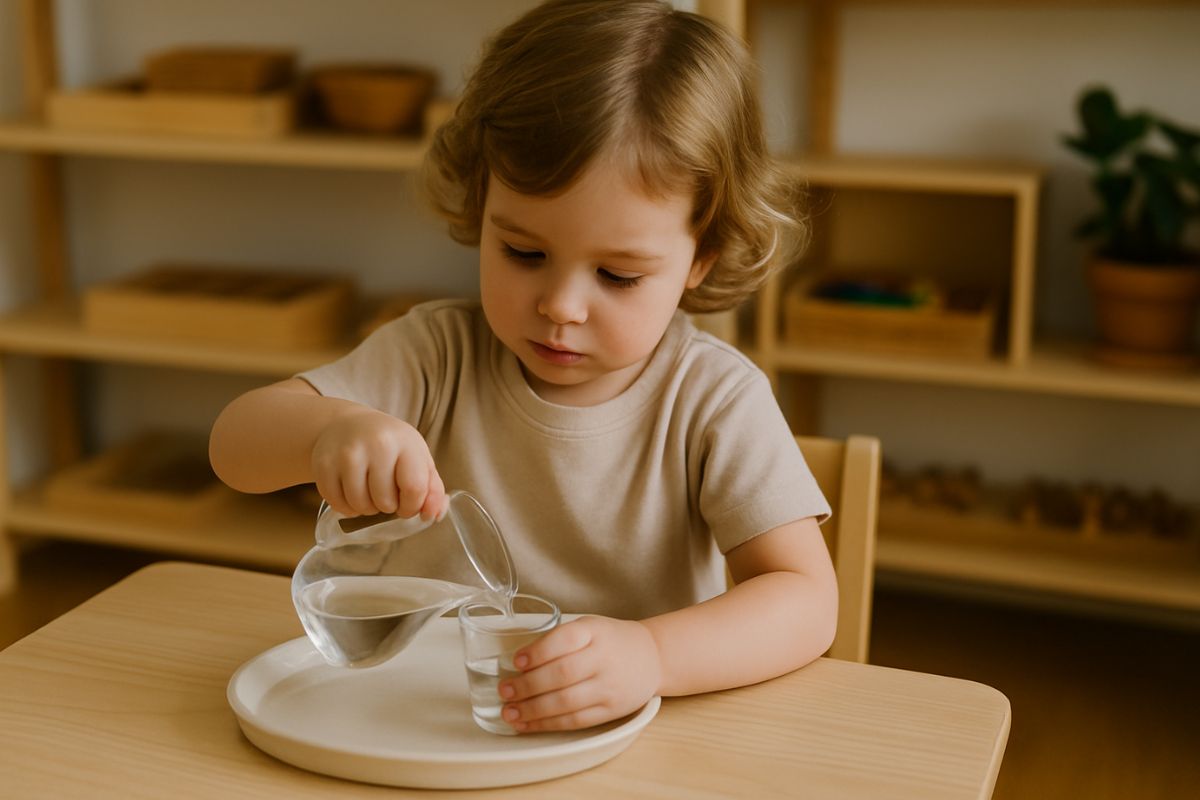In many traditional classrooms, a child’s success is judged by the final result. A perfect craft. A correct worksheet. A clean, finished project. But in Montessori education, what matters most is how the child got there. It’s not about the outcome. It’s about the journey.
Focusing on the process helps children develop skills they carry for life. They learn how to think, how to try, how to adjust when things don’t work. The pride comes not from showing off a polished product, but from knowing they did the work themselves—with care, effort, and attention.
Why This Approach Matters
This article explores how Montessori emphasizes the process of learning over the final result. It explains how this approach helps children build independence, creativity, and a deeper connection to their work.
You’ll see how materials, teacher guidance, and the classroom environment all support process-based learning. And you’ll find out why valuing effort over outcome creates more confident, capable learners.
Learning Is an Ongoing Experience
In Montessori classrooms, learning is not broken into neat boxes with clear right or wrong answers. Instead, it’s treated as a fluid experience. Children are encouraged to engage with a task over time, to try again, to go deeper—not just finish and move on.
A child pouring water may spill, adjust their grip, and try again. A child writing letters may trace, erase, and repeat until their hand feels steady. These actions are not failures. They are the work of learning.
When the process is honored, children don’t rush. They’re not trying to please someone else. They’re absorbed in what they’re doing, learning with purpose instead of pressure.
Confidence Grows from Trying, Not Perfection
When children are praised only for neatness or results, they may begin to fear mistakes. They might avoid challenges or stick to what they already know. But when the process is valued, mistakes become part of the journey.
In Montessori classrooms, teachers notice effort. They comment on how a child concentrated or persisted, not just how something looks. This kind of feedback builds real confidence. Children learn that growth comes from doing—not just from getting it right the first time.
They take pride in progress. They recognize that learning takes time. And they begin to see themselves as capable learners, not performers.
Materials Designed for Practice
Montessori materials are made for repetition and reflection. There’s no pressure to make something pretty. The focus is on understanding.
A child working with a puzzle map of the continents might repeat the activity many times—not to create a display, but to know where each piece belongs. A child using the pink tower is not building a sculpture. They are refining movement, order, and perception.
These materials don’t produce take-home projects. But they produce something far more lasting: confidence, patience, and deep understanding.
Teachers Support Without Judgment
Montessori teachers know that true learning takes time. They don’t rush children or praise only finished work. Instead, they observe, ask questions, and guide gently when needed.
If a child makes a mistake, the teacher doesn’t fix it right away. They wait to see if the child notices. If not, they may offer a quiet suggestion later—or even let the child discover the correction the next day.
This kind of patience shows children that learning is not about getting approval. It’s about discovering, practicing, and figuring things out on your own.
The Value of Concentration
One of the most important outcomes of process-focused learning is concentration. When children are not pressured to produce something for show, they can lose themselves in the task. They enter a state of focus that supports growth in every area.
This concentration helps children build inner discipline. It supports emotional regulation, memory, and decision-making. It also brings a quiet joy that comes from doing meaningful work with full attention.
Children who develop this kind of focus are more likely to enjoy learning throughout life. They are not distracted by reward or recognition. They find satisfaction in the doing.
Letting Go of the Product at Home
Parents can support this mindset at home by focusing less on results and more on effort. Instead of praising a tidy drawing, notice how your child chose colors or stayed with the task. Instead of asking “What did you make?”, ask “What did you enjoy doing?”
Provide materials that invite exploration without a fixed outcome. Let your child build, draw, sort, or create without pressure to show or explain. Give them time to repeat and refine.
When children feel free to focus on process, they develop curiosity and resilience. They’re more willing to try again, adjust their approach, and stick with challenges.
Creating a Calm, Respectful Space
The Montessori classroom is designed to support process-based learning. It’s quiet, orderly, and filled with materials that invite careful work. Children are not rushed. They are respected.
This atmosphere tells children that what they are doing matters—even if no one else sees the end result. They feel safe to take their time. They know their work belongs to them.
This feeling of ownership leads to deeper learning. It also creates a stronger sense of self. Children feel trusted, and that trust builds responsibility and care.
Lifelong Habits Start with How We Learn
The way children approach learning in their early years shapes how they will face challenges later. If they are taught to value process, they are more likely to become thoughtful, motivated adults.
They learn that mistakes are not signs of failure. They are signs of progress. They learn to reflect, adapt, and keep going. And they begin to see learning not as a task, but as a lifelong habit of the heart and mind.
Montessori education reminds us that the work children do every day—however simple or slow—is shaping their future. The product may fade, but the process builds a foundation that lasts.
